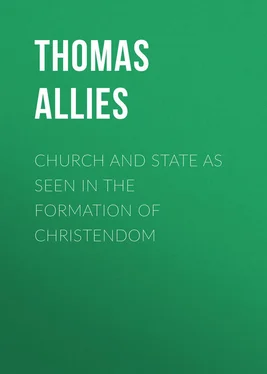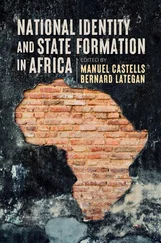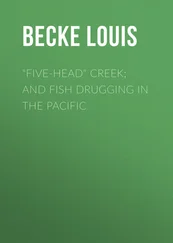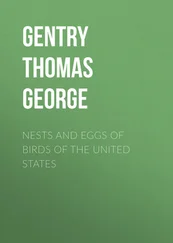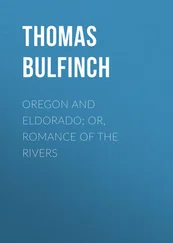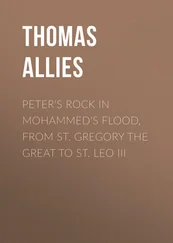Thomas Allies - Church and State as Seen in the Formation of Christendom
Здесь есть возможность читать онлайн «Thomas Allies - Church and State as Seen in the Formation of Christendom» — ознакомительный отрывок электронной книги совершенно бесплатно, а после прочтения отрывка купить полную версию. В некоторых случаях можно слушать аудио, скачать через торрент в формате fb2 и присутствует краткое содержание. ISBN: , Жанр: foreign_antique, foreign_prose, Историческая проза, на английском языке. Описание произведения, (предисловие) а так же отзывы посетителей доступны на портале библиотеки ЛибКат.
- Название:Church and State as Seen in the Formation of Christendom
- Автор:
- Жанр:
- Год:неизвестен
- ISBN:http://www.gutenberg.org/ebooks/38537
- Рейтинг книги:4 / 5. Голосов: 1
-
Избранное:Добавить в избранное
- Отзывы:
-
Ваша оценка:
- 80
- 1
- 2
- 3
- 4
- 5
Church and State as Seen in the Formation of Christendom: краткое содержание, описание и аннотация
Предлагаем к чтению аннотацию, описание, краткое содержание или предисловие (зависит от того, что написал сам автор книги «Church and State as Seen in the Formation of Christendom»). Если вы не нашли необходимую информацию о книге — напишите в комментариях, мы постараемся отыскать её.
Church and State as Seen in the Formation of Christendom — читать онлайн ознакомительный отрывок
Ниже представлен текст книги, разбитый по страницам. Система сохранения места последней прочитанной страницы, позволяет с удобством читать онлайн бесплатно книгу «Church and State as Seen in the Formation of Christendom», без необходимости каждый раз заново искать на чём Вы остановились. Поставьте закладку, и сможете в любой момент перейти на страницу, на которой закончили чтение.
Интервал:
Закладка:
The race had been cut down to the root because in the midst of knowledge and grace it had deserted God; and Noah, as he stepped forth from the ark, began with a solemn act of reparation. He “built an altar to the Lord and offered holocausts upon it of all cattle and fowls that were clean.” God accepted the sacrifice, inasmuch as it was in and through this act that He bestowed the earth upon Noah and his sons, and gave him everything that lived and moved on it for food. He consecrated afresh the life of man by ordaining that whoever took human life away, that is, by an act of violence, not of justice, should himself be punished with the loss of his own life; and He grounded this great ordinance upon the fact that man was made after the image of God. At the same time God repeated to Noah and his sons the primal blessing which had multiplied the race, and was to fill the earth with it, and made a covenant with him and with his seed for ever, a covenant to be afterwards developed, but never to be abrogated. It is to be noted that the sacred narrative dwells rather upon the sacrifice made by Noah immediately upon issuing from the ark than upon the original sacrifice offered by Adam. Of the first institution of sacrifice it makes only incidental mention, referring with great significance to those skins of beasts, of which God provided a covering for the nakedness of Adam and Eve. It is as if the rite of sacrifice, instituted as a prophecy of the future expiation of sin, might fitly supply from the skins of its victims a covering for that nakedness which sin alone had revealed and made shameful. The mention of this fact ensues immediately upon the record of the fall, before Adam is cast out of paradise. And again, by the mention of the sacrifice of Abel, and of its acceptance, it is shown that the rite already existed in the children of the first man. But now the sacrifice of Noah, and the covenant made in it, as being of so vast an import to every succeeding generation, is described at length as the starting-point of the whole renewed, that is, the actual race of man. In this sacrifice it is emphatically declared that “the Lord smelled a sweet savour,” since it stood at the beginning of man’s new life, coming after the waters of the deluge as the image and precursor of the Sacrifice on Calvary, which was to purify the earth, and which those waters typified.
As, then, we considered lately the position of man as to his knowledge of God and of himself in the “many days” which ensued after the fall before the death of Abel, so let us glance at his condition in these same respects at the starting-point of this new life of man. First of all, out of the wreck of the old world Noah had carried the two institutions, one of which makes the human family in its natural increase, while the other constitutes its spiritual life – marriage and sacrifice. In marriage we have the root of society; in sacrifice the root of religion. These had not perished, neither had they changed in character. They were the never-displaced foundation of the race, an heirloom of paradise never lost; marriage, as established in the primeval sanctity before man fell, sacrifice as superadded to man’s original worship of adoration, thanksgiving, and prayer immediately upon his fall, in token of his future recovery. God, in selecting Noah to repair the race, made him, in so far like to Adam, the head of the two orders, King and Priest, and from that double headship the actual government of the world through all the lines of his posterity descends.
Thirdly, we find in Noah’s family the divine authority of government expressly established; for in the protection thrown over human life the power to take it away in case of grievous crime is also given. Authority to take life away belongs of right to the giver of life alone. He here bestows the vicarious exercise of it upon that family which was likewise the first State, and the fountain-head of actual human society. “At the hand of every man, and of his brother, will I require the life of man: whosoever shall shed man’s blood, his blood shall be shed, for man was made to the image of God. But increase you, and multiply, and go upon the earth, and fill it.” We have then the charter here of human society; 8 8 Leo XIII., in the great Encyclical of June 29, 1881, says: “It is also of great importance that they by whose authority public affairs are administered may be able to command the obedience of citizens, so that their disobedience is a sin. But no man possesses in himself or of himself the right to constrain the free-will of others by the bonds of such a command as this. That power belongs solely to God, the Creator of all things and the Lawgiver; and those who exercise it must exercise it as communicated to them by God. ‘There is one lawgiver and judge who is able to destroy and to deliver’ (James iv. 12).”
the delegation to it of supreme power by the Head of all power, to be vicariously exercised henceforward over the whole race as it went out, conquered, and replenished the earth; the sacredness of man’s life declared, in virtue of that divine image according to which he alone of all creatures upon the earth was made, yet power over that life for the punishment of crime committed to man himself in the government established by God. An absolute dominion over all beasts was given at the same time to man; first for himself, in virtue of his distinction from the beast, in virtue of the divine image resting upon him, a delegation of divine power was set up in the midst of him, the supreme exercise of which is the power of life and death. Civil government therefore was no less created by God than marriage, and sacrifice, with the religious offices belonging to it. Like them it was ratified afresh in the race at this its second starting-point.
But, fourthly, it was as Father and Head of the race that the first act of Noah leaving the ark was to offer sacrifice; he offered it for himself and for all his children. With him, as offering in a public act the homage of his race, the great covenant of which we have been speaking was made. Besides the divine things bound together in the institution of sacrifice – the accord of four acts, adoration, thanksgiving, prayer, and expiation, which express man’s knowledge of his condition of God’s sovereignty, and of his own last end, as well as the dedication of his will to God – great temporal promises, such as the dominion over all other creatures, and the filling the earth with his race, promises which belong to man as one family and one race, were made to Noah in this solemn covenant ratified in sacrifice. The common hopes of the whole community for the present life and the future also were jointly represented in it. It is, in fact, the alliance of the civil government with religion, of which we see here the solemn ratification. Noah the Father, the King, and the Priest, sacrifices for all, where all have a common hope, a common belief, a common knowledge, a life not only as individual men, but as a family, as a race, as a society.
Thus in marriage, in sacrifice, in the vicarial exercise of divine power by civil government, and in the alliance of that government with the worship of God, we have the four central pillars on which the glorious dome of a sacred civilisation in the human family, when it should be conterminous with the whole earth, was intended to rest. These four things date from the beginning of the race; they precede heathenism, and they last through it. Greatly as man in the exercise of his free-will may rage against them, grievously as he may impair their harmony, and even distort by his sin the vast good which that harmony ensures and guards into partial evil, yet he will not avail to destroy the fabric of human society resting upon them before the Restorer comes.
Noah having lived 600 years before the flood, and having been the preacher of justice for 120 years to a world which would not listen to him, has his life prolonged for 350 years after the flood. During this time he is to be viewed as the great Teacher of his family, like Adam when he came out of Paradise. What the Fall was in the mouth of Adam the Deluge was in the mouth of Noah, a great example of punishment inflicted on man for the disregard of God as his end. It is hard to see how God could have more completely guarded those two beginnings of human society from the corruption of error and the taint of unfaithfulness than by the mode in which He caused them to arise, in that He formed them both through the teaching of a family by the mouth of a Parent, and the government of a race by the headship of its Author. For the larger society sprung actually out of brethren as the brethren themselves out of one parent. “They have,” to use Bossuet’s striking recapitulation, “one God, one object, one end, a common origin, the same blood, a common interest, a mutual need of each other, as well for the business of life as for its enjoyments.” And one common language, it may be added, serves as the outward expression, the witness, and the bond of a society so admirably compacted, based, as it would seem, on so immovable a foundation.
Читать дальшеИнтервал:
Закладка:
Похожие книги на «Church and State as Seen in the Formation of Christendom»
Представляем Вашему вниманию похожие книги на «Church and State as Seen in the Formation of Christendom» списком для выбора. Мы отобрали схожую по названию и смыслу литературу в надежде предоставить читателям больше вариантов отыскать новые, интересные, ещё непрочитанные произведения.
Обсуждение, отзывы о книге «Church and State as Seen in the Formation of Christendom» и просто собственные мнения читателей. Оставьте ваши комментарии, напишите, что Вы думаете о произведении, его смысле или главных героях. Укажите что конкретно понравилось, а что нет, и почему Вы так считаете.
